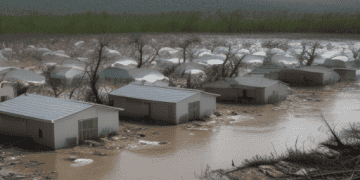As the humanitarian crisis in Lebanon escalates amid regional tensions, disaster response efforts are increasingly focusing on proactive measures to mitigate the impact of future crises. With winter approaching, emergency responders are preparing for potential additional challenges, such as cold snaps and snowstorms, which could further strain communities already affected by conflict and displacement.
One critical approach being emphasized is anticipatory action, which involves planning and initiating response efforts based on forecasts before a disaster occurs. This method helps not only save lives but also ensures that resources are allocated efficiently to address a wide range of humanitarian needs.
Kassem Chaalan, Disaster Risk Reduction Director at the Lebanese Red Cross, highlighted the effectiveness of anticipatory action, particularly during winter storms. “Ahead of a severe winter season with expected heavy snowfall in early 2024, the Lebanese Red Cross and its partners took proactive measures, using weather forecasts to alert communities and issue early warnings to vulnerable groups,” said Chaalan. The initiative also included providing guidance to communities on how to prepare for storms, thereby reducing the negative impact and minimizing losses.
The Lebanese Red Cross has employed similar proactive strategies during heatwaves, disseminating actionable messages during extreme summer temperatures to protect urban populations.
In Yemen, where floods are a recurring threat, the Yemen Red Crescent Society has been piloting an anticipatory action program in partnership with meteorological and civil defense authorities. The initiative, focused on the governorates of Sana’a and Hadramout, uses a Simplified Early Action Protocol (SEAP) activated when heavy rainfall is forecast. This allows the Red Crescent to respond quickly and prepare communities for potential flooding, reducing risks and improving preparedness.
The Middle East and North Africa (MENA) region faces a range of vulnerabilities, including natural disasters, climate change effects, and ongoing conflicts. These factors contribute to high levels of humanitarian need, including displacement and instability. Anticipatory action is proving to be an effective tool in addressing these challenges.
To further enhance collaboration and response efforts, National Societies from the MENA region gathered at the 1st MENA Dialogue Platform in Dubai. The platform served as a space for sharing best practices, fostering connections with international partners, and developing strategies for effective crisis response.
Chaalan emphasized the importance of the platform in enhancing networking and collaboration across the region, noting that it has helped increase the collective impact of humanitarian organizations. The growing frequency of natural hazards in the region underscores the value of anticipatory action as an essential strategy for disaster risk reduction and sustainable development.
By addressing vulnerabilities in advance, anticipatory action improves community safety and resilience, offering a forward-looking approach to disaster response in the MENA region.
Explore comprehensive supply chain news at The Supply Chain Report. Those interested in international trade can visit ADAMftd.com for free tools.
#DisasterRiskReduction #AnticipatoryAction #ResilientCommunities #ClimateCrisisPreparedness #SustainableFuture















